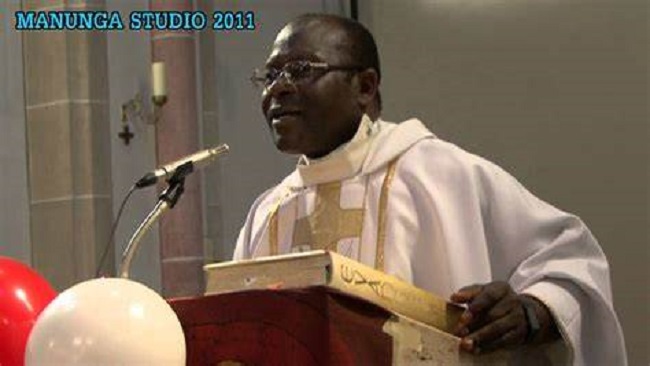Leading Roman Catholic cleric says Cameroon is dancing toward self-destruction
A leading Cameroonian priest has warned that the country is “dangerously dancing toward self-destruction,” blasting a series of corruption scandals and acts of violence that have marred the west African nation.
“These are very uncomfortable atrocities that have happened in our midst, and which sometimes, we rather tacitly” accept them through silence, said Father Humphrey Tatah Mbuy, Director of Communications at the Catholic Bishops’ Conference of Cameroon.
In one of his weekly programs, “Faith Seeking Understanding,” broadcast this week, Mbuy catalogued several incidents that have rocked Cameroon of late.
He began with the murder of journalist Martinez Zogo, who was kidnapped January 17, and whose mutilated body was found near the capital Yaoundé five days later. Zogo was a constant voice of criticism against government corruption.
Mbuy also discussed scandals surrounding the construction of a Yaoundé-Douala motorway. The first 60 kilometers of the highway have now cost in excess of $1 billion, with much of that amount believed to have been stolen by corrupt officials.
COVID-19 funds that were also allegedly stolen, Mbuy mentioned. Several government officials, including the Prime Minister Joseph Ngute, have been questioned about the theft of about $300 million allocated for the fight against COVID, but so far, no one has been arrested in connection with the investigation.
The same goes with the theft of funds allocated for the construction of sports stadiums in the country. Recently, another corruption scandal was unraveled at the country’s finance ministry in which a cluster of private individuals and government entities had benefited from ‘miscellaneous expenses’ contained in line items in the state budget to the tune of about $9 billion between 2010 and 2021.
Mbuy lauded the oldest Member of Cameroon’s National Assembly, Koa Mfegue Laurentine Mbede, who recently warned that “all this must stop, or our beautiful and dear fatherland will be transformed into a land of scandals.”
“Perhaps the honorable lady was truly referring to the shock and feelings of betrayal suffered by those who are surprised and disgusted to learn of the complicity of their leaders in wrong-doing,” the priest said.
A nation of roughly 30 million, Cameroon is roughly half Christian, with Catholics making up the largest single religious group in the country.
Mbuy said it’s critical for Cameroonians to speak out in the face of scandal and corruption, because “One who keeps quiet instead of unveiling evil that is going on consents to such evil.”
He said although God fashioned man in his image, he also respects man’s freedom to freely choose between good and evil, and this could partly explain the preponderance of scandals in society today.
“Each and every baptized Christian is called upon to evangelize and bring the good news to the poor, the lame, and the blind, to bring liberty to captives and to set the down-trodden free,” Mbuy said.
“The Church, as a teacher, is called to investigate, to find out, to teach and to defend the truth. The Church can never at any time stand on what is evil.”
Mbuy said the need to build a moral society void of scandals arises out of the theological definition of scandal as “moral outrage.”
In other words, “a word or an action which leads to the spiritual ruin of another person…The problem with scandal is not with the person committing even the scandal, it’s already bad enough that he commits. The problem with scandal is that it induces others to sin. It is because of others that scandals become worrisome,” Mbuy said.
He called on Church leaders to be the moral compass of society, and notwithstanding their human weaknesses, “there is a certain amount of discretion that each church leader must possess and which society has a right to expect from each of them. The same applies to those in public service, called to be servants of the people in their administration and political choices.”
He said a few moral principles are necessary to handle the many scandals in Cameroonian society today.
“First, public scandals must be handled and resolved publicly, while private scandals are to be handled privately. Second, there is absolute necessity to make amends, repair or restitution in cases of public scandals. Third, public scandals deserve sanctions to act as deterrents so that others may not follow the bad example. Since a scandal is a moral poisoning of the society, each deserves to be handled with absolute cold headedness and skill, ensuring that the impression is not given that we condone evil. Evil is to be fought at all costs and with the utmost ferociousness.”
Mbuy expressed regret that society has been besieged by “such a nauseating secularism and Marxist materialism that we tend to act with shocking levity of mind over issues which would otherwise frighten anyone with a disciplined mind.”
“If our society is dangerously dancing towards self-destruction, part of the central reason lies in our insensitivity towards what is wrong and inadmissible,” he said.
“For people who still think about the future and those coming after, there is every reason to continue to stand on the side of good against evil, upholding integrity, rather than give in to licentiousness, but apparently, the beautiful ones are not yet born, or the gods must be crazy,” he said.
Culled from Crux




